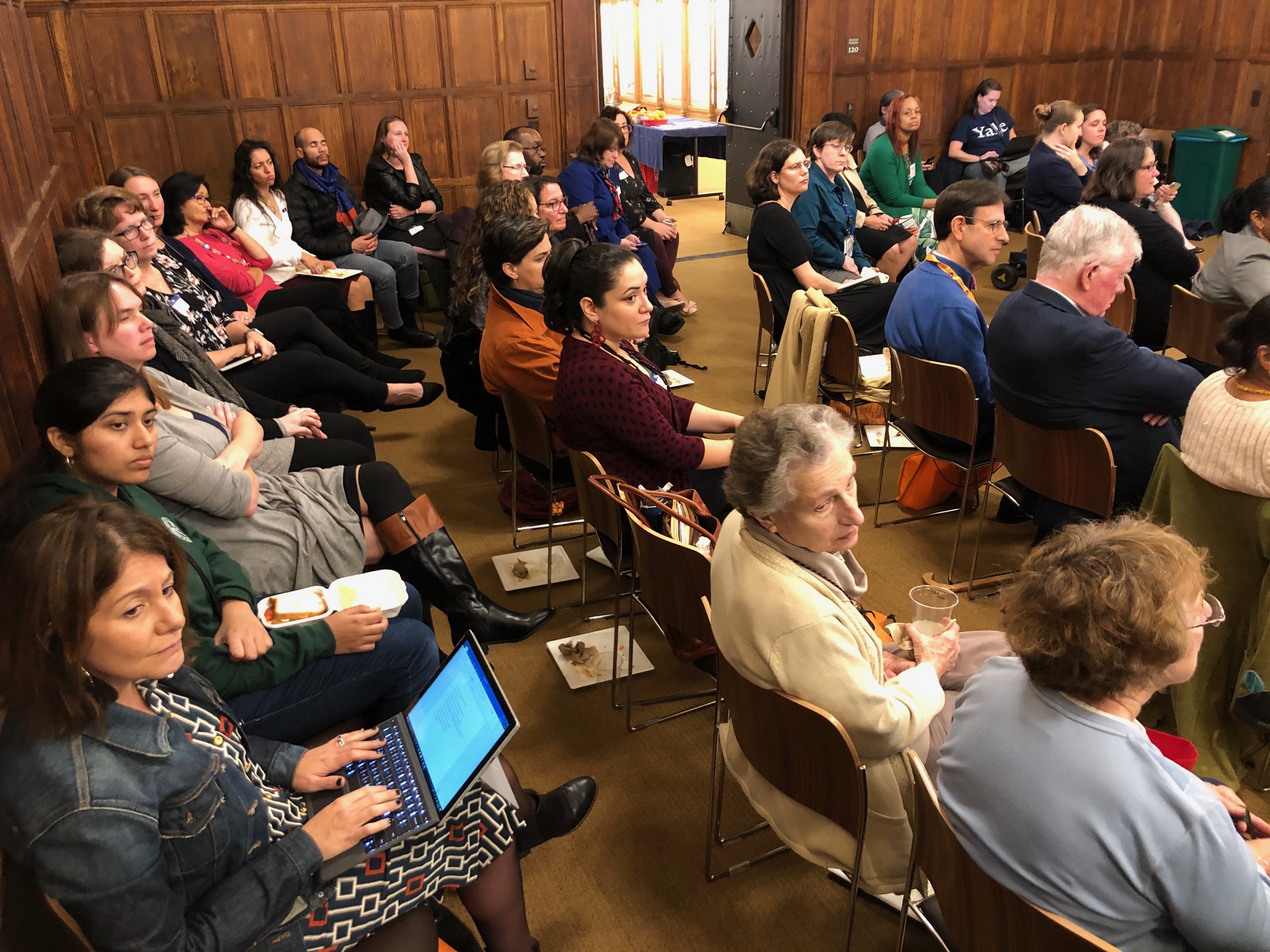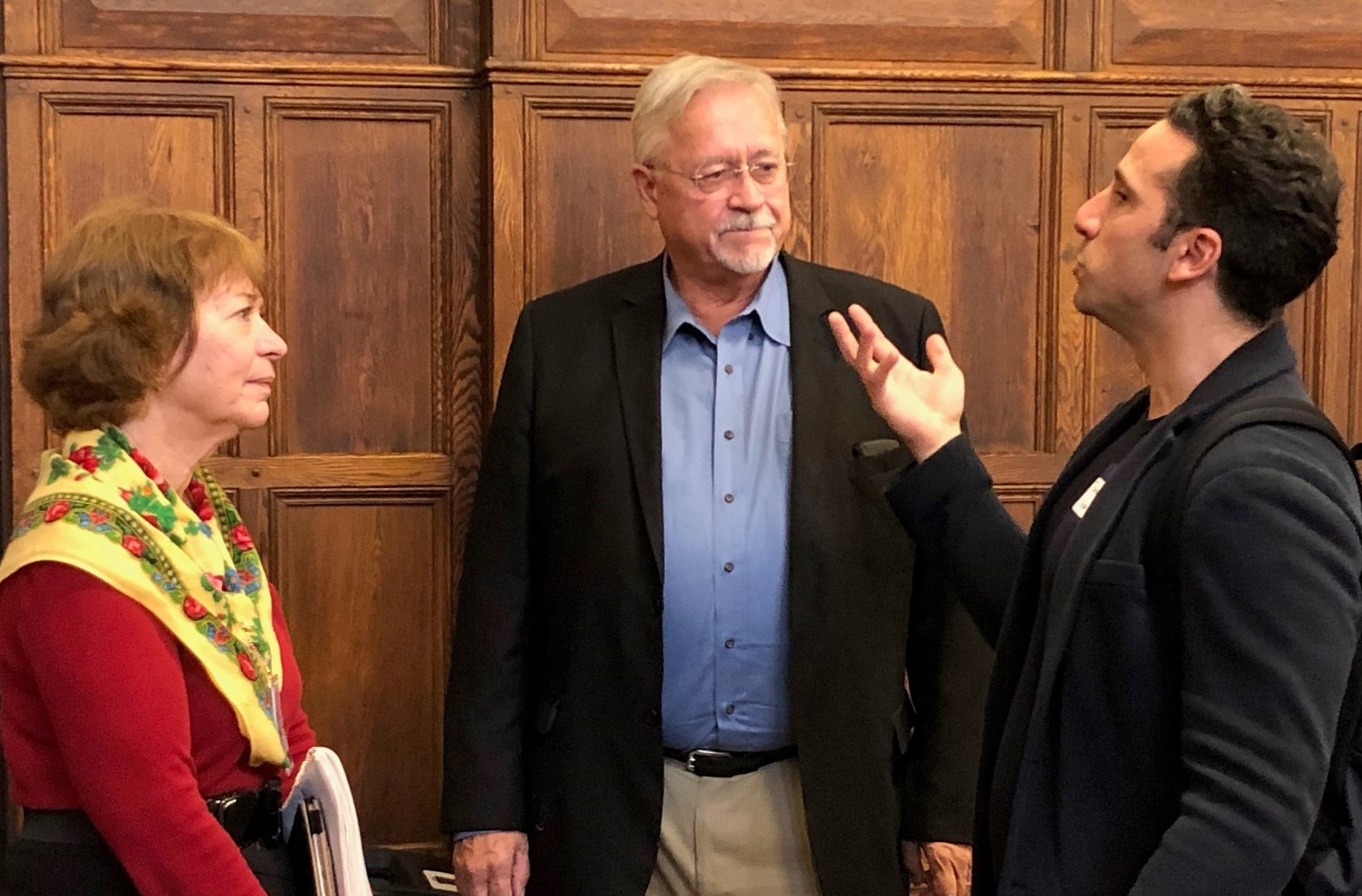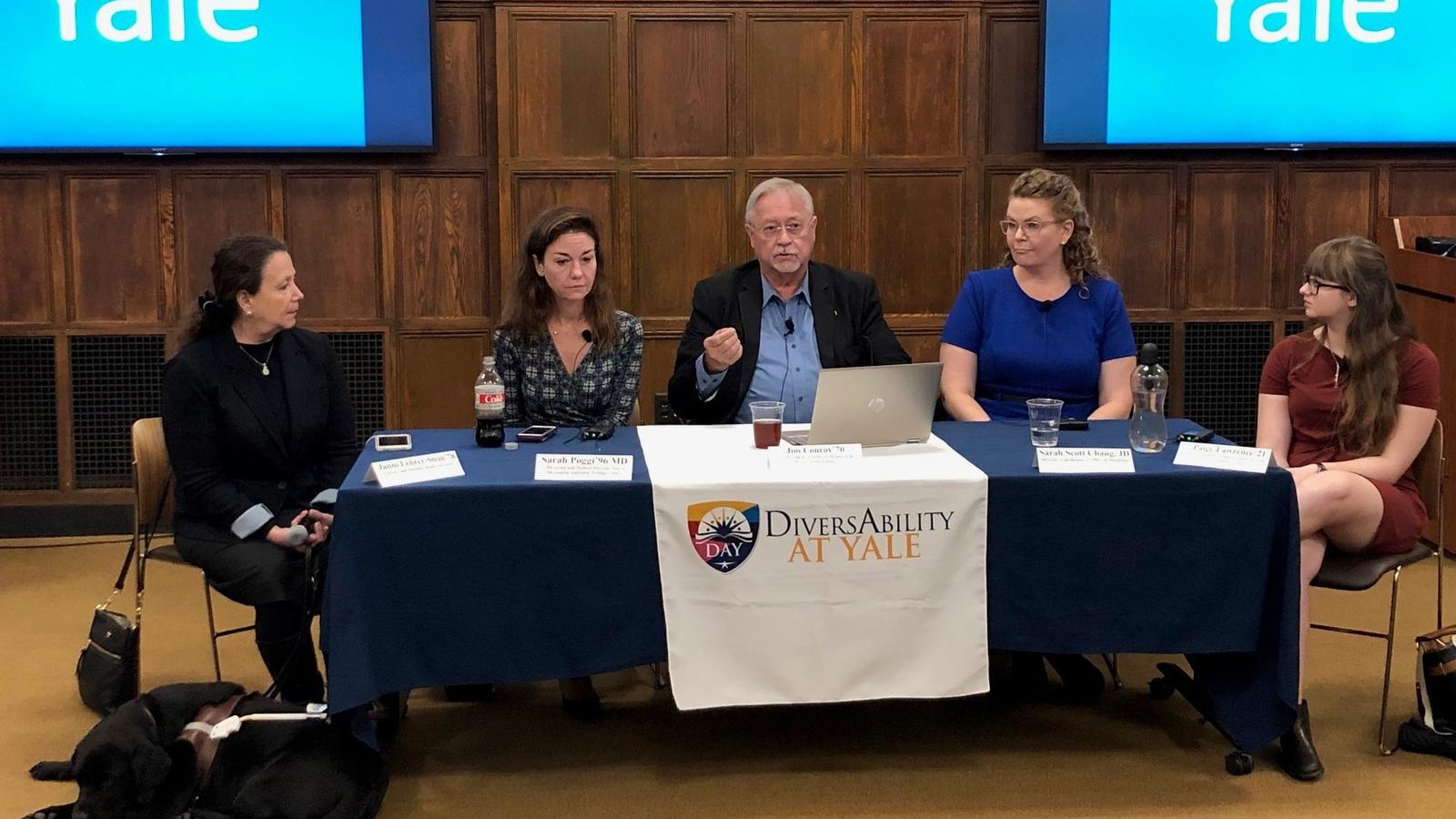Members of the Yale community, led by alumni, recently convened on campus to engage in a candid and substantive dialogue on disability, equity, inclusion at Yale and in the United States, in observance of National Disability Awareness Month.
Hosted by the Yale Alumni Association and co-sponsored by two university partners – the Yale Office of Diversity and Inclusion, and DiversAbility at Yale – the forum was composed of three alumni, one staff member, and a student leader, each contributing their thoughts, perspectives, and experiences on disability and those who live with disability:
- Janni Lehrer-Stein ’78 – Attorney and disability rights advocate who served on the National Council on Disability under the Obama administration
- Jim Conroy ’70 – Co-president of Pennhurst Memorial & Preservation Alliance, a nonprofit organization working with other individuals and groups to advocate for the establishment of a National Museum of Disability History and Civil Rights
- Sarah Poggi ’96 MD – Physician and Medical Director at Inova Alexandria Antenatal Testing Center
- Sarah Scott Chang – Director of Yale Student Accessibility Services, which coordinates and provides accessibility services and accommodations on campus for all students with disabilities
- Paige Lawrence (Yale College, Class of 2021) – President of Disability Empowerment for Yale (DEFY), a student-led advocacy group
Lehrer-Stein, the moderator, who has progressive blindness from retinitis pigmentosa, an inherited retinal degenerative disease, kicked off the conversation by asking Lawrence and Chang about the experiences of students with disabilities, the accessibility situation on campus, and attitudes toward disability at Yale.
Lawrence, who has an immunodeficiency condition requiring her to undergo treatment for the rest of her life, pointed out that while students with disabilities tend to form particularly strong, tight-knit bonds with one another due to their shared experiences, they participate in many facets of student life and are engaged in a variety of activities on campus. She and members of DEFY are all actively involved with other student groups with broad representation across different organizations, noting that other student groups have been “generally very supportive of having students with disabilities.”

According the Lawrence, DEFY has made strides in cultivating a more inclusive community on campus, including affiliating with the cultural centers, becoming more inter-sectional in their outreach, working with student organizations and faculty groups, and reaching out to graduate and professional students to form a larger network and base of support.
Recently, DEFY members pooled their collective experiences and produced a 26-page resource guide that serves as a how-to manual for students with disabilities on surviving and flourishing at Yale. Entitled Disability @ Yale Survival Guide, the document can be accessed online.
Chang indicated that about 10% of the student population (of 5,964 undergraduates and 7,469 graduate and professional students) are registered with and supported by Student Accessibility Services. However, as her office relies on voluntary disclosure, the actual need for services and accommodations is higher since not all students with disabilities are registered or identified.
According to Chang, besides the difficulties students with disabilities encounter in receiving services and accommodations, another challenge they cope with is the “culture of perfection” that exists on campus, where there is not always “a lot of grace allowed for people who are not perfect, for people who are struggling.”
The stigma of disability as a weakness, as a deficiency, persists on campus and sadly, said Chang, a lot of students have internalized this idea. To combat this, a culture change is necessary, with higher emphasis placed on inculcating an “inclusion mindset.” She noted, however, that there is a great deal of support within the campus community to promote this attitudinal shift.
“People at Yale want to do the right thing,” said Chang.
***
Pivoting the discussion from campus to alumni, Lehrer-Stein turned to Conroy and Poggi for their experiences and perspective vis-à-vis disability.
Conroy shared that his journey as a disability rights advocate began nearly five decades ago, when he was involved with a government-contracted study on the Pennhurst State School and Hospital in Pennsylvania and other institutions across the country that housed and treated patients with disabilities. That study, along with others with which Conroy was involved over the years, revealed a widespread pattern of atrocious living conditions and inhumane treatment, including physical abuse, intimidation, sexual assault, and exploitation.
To ensure that the abuses and lessons of Pennhurst, as well as the struggles of the disability rights movement, would not be forgotten, Conroy in 2008 co-founded the Pennhurst Memorial and Preservation Alliance and has been steadily working since to mobilize grassroots support for the establishment of a National Museum of Disability History and Civil Rights.
According to Conroy, there is growing bipartisan support in Congress to stand up a commission and explore establishing such a museum, which would be based in Washington, D.C., and affiliated with the Smithsonian Institution, along the same lines as the Holocaust Memorial Museum, the National Museum of the American Indian, and the National Museum of African American History and Culture.
From the perspective of someone who has cared for a loved one with a severe disability, Poggi, a physician who specializes in maternal-fetal medicine and high-risk pregnancies, spoke poignantly about her experiences as the spouse and caretaker of her late husband, Matt Poggi ’92 BA/MA, ’96 MD, who passed away in April of complications from multiple sclerosis. He was 49.

In the four years he was quadriplegic before passing, Matt required a great deal of medical treatment and assistance. According to Poggi, he was taking up to 35 pills a day, had six aides, was admitted 29 times to the hospital, and underwent 11 surgeries, including amputation of his lower left leg because of a pressure sore. Poggi shared that the experience of taking care of Matt during this period often left her utterly exhausted and spent.
“I was bone-tired for the four years that he was quadriplegic,” she said.
As much as Poggi wanted to, taking care of Matt full time was not an option; she had to continue working to pay for his care and medical expenses. While she and Matt were in relatively good shape financially since they saved, had a nest egg, and for a time, both had their incomes, the escalating medical expenses exacted a toll.
“We weren’t bankrupt by it,” she said, “but we definitely took a hit.”
Much more difficult than the financial toll, however, was the emotional one. Poggi recounted that her two daughters once told her they felt they were down to “half a parent” because she spent so much time caring for Matt – for which Poggi still feels some guilt. She also shared that there were many occasions when she felt considerable frustration and “wasn’t always the nicest” because of the collective stress, anxiety, and pressures of being a caretaker, spouse, and parent.
Those challenging times, however, were also marked by enormous growth. In the years Poggi cared for Matt, she never missed a single day of work, and through the experience, developed greater self-confidence, resilience, and empathy for others. Acknowledging there were occasions when the thought of placing Matt in a care facility had crossed her mind, she is thankful she never went through with it, and expressed her deep gratitude for the time she was able to spend with Matt and care for him.
“I’m proud I never put him in a nursing home,” said Poggi.
Ironically, said Poggi, she would not have been able to participate in a public forum and discuss her experiences and recollections so openly if Matt were still alive, due to feelings of guilt. She hopes, however, that her narrative provides strength and comfort to others who are caring for loved ones with disabilities.
***
In closing, Lehrer-Stein noted with 2020 marking the 30th anniversary of the Americans with Disabilities Act, Yale alumni are uniquely qualified to advance the work of promoting inclusion and access on campus and in communities around the world. She called upon classmates and fellow alumni to examine more closely their family, social, and professional circles without fear, bias, or hesitation to harness the contributions and potential of people with disabilities for the betterment of their communities and society at large.
“I want to see us fully included,” said Lehrer-Stein.
###
For more information about the Yale DiversAbility alumni initiative, contact Henry Kwan ’05 MA, director for shared interest groups, Yale Alumni Association.





